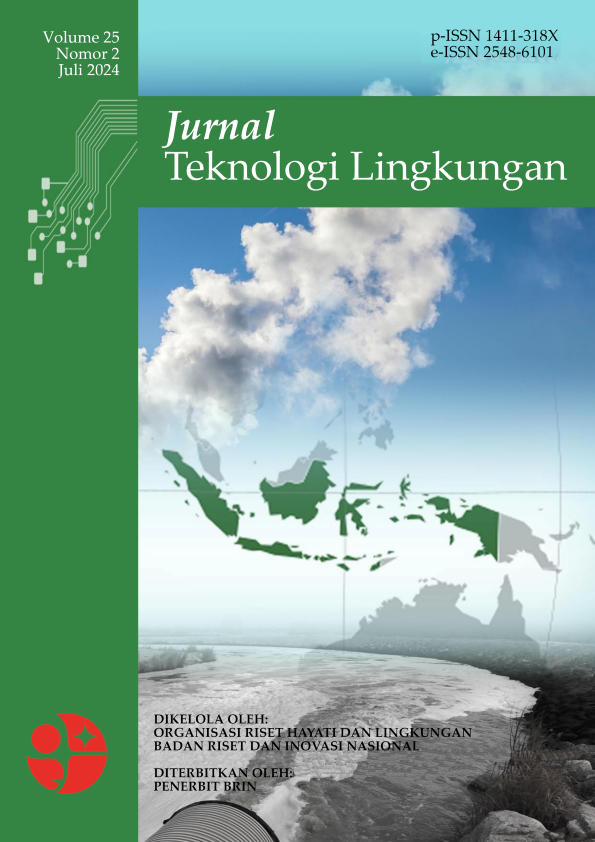Pengaruh Rasio Campuran Abu Sekam Padi dan Zeolit terhadap Waktu Ikat, Berat Isi, dan Kuat Tekan Mortar Geopolimer Ramah Lingkungan
Main Article Content
Abstract
Portland cement is an ingredient in mortar in the building industry. Portland cement manufacturing emits vast amounts of CO2, causing detrimental repercussions such as global warming. As a result, a less harmful cement alternative material, such as geopolymer, is required. The production of geopolymer materials requires components containing large amounts of Si and Al, such as rice husk ash (RHA) and zeolite, as well as alkaline activators, such as NaOH and Na2SiO3, which function as binding solutions for Si and Al in the geopolymerization reaction. The purpose of this study was to determine the mixed ratio effect of rice husk ash and zeolite on the setting time, density, and compressive strength. The method was used experimentally, with making samples size 5 cm x 5 cm x 5 cm and oven curing at 60°C for 24 hours to retain the quality of the geopolymer mortar. To study the effects of precursor on mortar compressive strength and compare the compressive strength of RHA-zeolite geopolymer mortar with portland cement mortar, five different geopolymer mortar compositions were used: 100% RHA, 90% RHA-10% zeolite, 70% RHA-30% zeolite, 50% RHA-50% zeolite, and 100% zeolite. The results of this study reveal that a high Si concentration in the geopolymer mortar increases compressive strength. The highest geopolymer mortar compressive strength values were in the composition of 100% ASP with values at 7, 14, and 28 days, respectively 1.7 MPa, 2.5 MPa, and 2.8 MPa, despite the fact that geopolymer mortar has a lower compressive strength than portland cement mortar.
ABSTRAK
Semen portland merupakan bahan yang digunakan pada mortar dalam industri bangunan. Terdapat dampak negatif pada proses produksi semen portland di mana menghasilkan gas CO2 yang besar sehingga pemanasan global terjadi. Adanya dampak negatif tersebut diperlukan material semen alternatif yang ramah lingkungan, seperti geopolimer. Produksi geopolimer memerlukan bahan yang mengandung Si dan Al tinggi, seperti abu sekam padi dan zeolit, selain itu perlu alkali aktivator sebagai binder dalam reaksi geopolimerisasi seperti NaOH dan Na2SiO3. Tujuan penelitian ini untuk mengetahui pengaruh rasio campuran antara abu sekam padi dan zeolit terhadap waktu ikat, berat isi, dan kuat tekan. Metode yang digunakan adalah eksperimental dengan membuat sampel berukuran 5 cm x 5 cm x 5 cm kemudian diberi perlakuan berupa perawatan oven di 60 °C selama 24 jam untuk menjaga kualitas mortar geopolimer. Dalam mempelajari efek unsur prekursor pada campuran mortar melalui perbandingan kuat tekan mortar geopolimer dan mortar semen yang diuji menggunakan mesin kompresi beton, terdapat 5 jenis komposisi campuran mortar yang dipakai yaitu 100% ASP, 90% ASP-10% zeolit, 70% ASP-30% zeolit, 50% ASP-50% zeolit, dan 100% zeolit. Hasil yang diperoleh dalam penelitian ini adalah mortar geopolimer dengan kandungan Si yang tinggi meningkatkan kekuatan tekannya. Nilai kuat tekan mortar geopolimer terbaik adalah pada komposisi 100% ASP dengan nilai kuat tekan pada 7, 14, dan 28 hari sebesar 1,7 MPa, 2,5 MPa dan 2,8 MPa, tetapi kuat tekan mortar geopolimer masih lebih rendah daripada mortar semen portland.
Article Details

This work is licensed under a Creative Commons Attribution-ShareAlike 4.0 International License.

